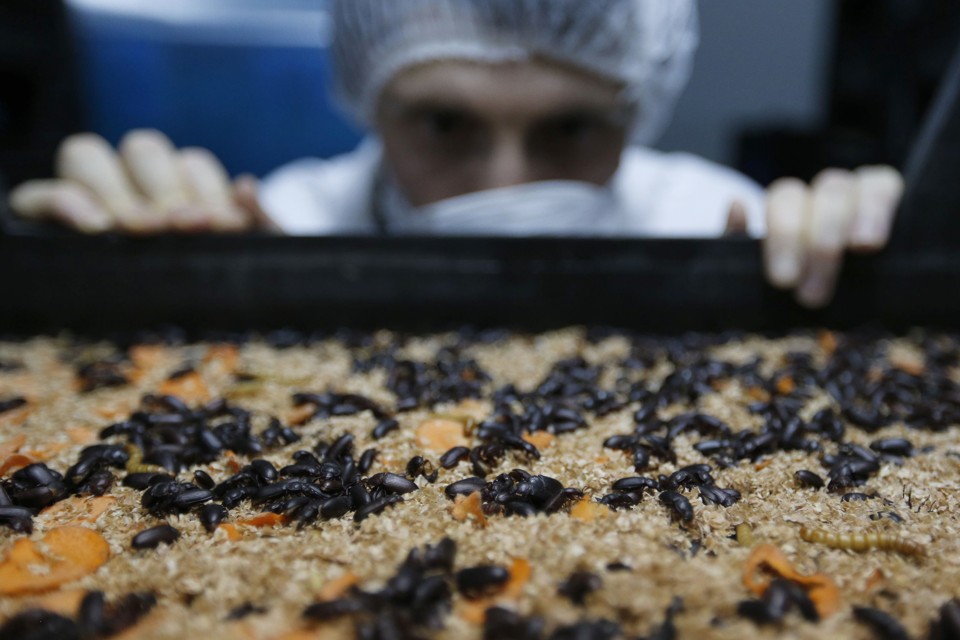The Ed's Up #112

Health Experts Are Explaining Drug-Resistant Bacteria Poorly
"Their understanding of antibiotic resistance is even worse. The researchers asked them about it and got blank faces in response. When probed—and here’s the bit that really shocked me—almost everyone assumed that it’s the person who becomes resistant to antibiotics, not the microbes. You take enough of something, they reasoned, and your body gets used to it and builds up a tolerance. It’s such an intuitive idea that even after they read simple descriptions that explained how bacteria become resistant, they reverted to the resistant-patient idea." (Image: NIAID)
The Algorithm That Creates Diets That Work for You
"By comprehensively monitoring the blood sugar, diets, and other traits of 800 people, they built an algorithm that can accurately predict how a person's blood-sugar levels will spike after eating any given meal. They also used these personalized predictions to develop tailored dietary plans for keeping blood sugar in check. These plans sometimes included unconventional items like chocolate and ice-cream, and were so counter-intuitive that they baffled both the participants and dieticians involved in the study. But they seemed to work when assessed in a clinical trial, and they hint at a future when individuals will get personalized dietary recommendations, rather than hewing to universal guidelines." (Image: Sharon Stapleton)

This Animal Has A Suit of Armor with Hundreds of Built-In Eyes
"Many animals are covered in protective armour—shells, scales, plates, and frills that protect their soft bodies. But one group of little-known sea creatures called chitons have evolved armour that's unlike anything else in nature. Because it contains eyes. Hundreds of eyes. With lenses made from rock, that erode as the animals age and have to be continuously replaced." (Image: Wikimedia)

How Fairness Develops in Kids Around the World
"These and other experiments have shown that our aversion to advantageous inequity (when we get more than others) is distinct from our aversion to disadvantageous inequity (when others get more than us). These two reactions involve different parts of the brain. They appear at different ages. They appear in different species: Chimpanzees and capuchins don't like disadvantageous inequity, but they'll tolerate the advantageous kind just as much as 4-year-old humans. Now, McAuliffe and Blake have found that this distinction also depends on where we come from. By running the same experiments in seven countries around the world, they showed that kids universally dislike getting less than others, but they only dislike getting more than others in some cultures." (Image: Soe Zeya Tun)
Why Pumpkins And Squashes Aren’t Extinct
"The pumpkin shouldn’t exist. Nor should squashes, gourds, and courgettes. These common dinner-table vegetables are all part of a group of plants called Cucurbita, whose wild ancestors were deeply bitter and encased in tough rinds. They depended on large animals like mammoths to break them apart and disperse their seeds. And when these megabeasts went extinct, the squashes should have followed them." (Image: Dyogl)
The World’s Most Popular Insecticides Are Messing With Bees
"The most widely used insecticides in the world—neonicotinoids—turn bumblebees into more bumbling pollinators, leading to lower yields for apples and perhaps other plants that they visit. That’s the message from a new study by Dara Stanley at the Royal Holloway University in London, the first to show that neonicotinoids affect the plants that rely on bees, as well as the insects themselves. It’s the latest in a damning and growing body of evidence about the negative consequences of these chemicals." (Image: Wikimedia)
Do Organisms Become More Evolvable in Times of Stress?
"Imagine that you wake up in a pit, surrounded by people who are all wounded and bleeding. Something had clearly gone horribly wrong. Maybe you panic. Maybe you tend to the wounded. Maybe you team up to plan an escape. But if you’re a red flour beetle, you do none of those things. Instead, you quietly become more evolvable." (ImagE: Regis Duvignau)
More good reads
- "The qualities we want in a child or in society can’t be had by tweaking a few nucleotides. There are no short cuts." Nathaniel Comfort on the long history of trying to make designer babies and why CRISPR doesn't change that.
- The slightly sad tale of America's lonely, overworked, only full-time forensic pollen analyst. By Elon Green
- Even when diseases are eradicated, the world can remain one lab accident away from their reappearance. Important piece by Maryn McKenna.
- No More Research Chimpanzees, Says NIH. Dan Vergano reports.
- The woman who got impregnated by a bullet, and other science stories that are total lies. By Rose Eveleth.
- "The blood that ran through that street also runs through me." A beautiful piece by Nadia Drake on science writing in a time of atrocity.
- Plight of the Funny Female – Olga Khazan on why the humor of men is appreciated so much more than that of women
- Neuroplasticity won't turn you "into a broccoli-loving, marathon-running, disease-immune, super-awesome genius." By Will Storr.
- This paper, by Bobbie Spellman, is the single best summary of psychology's replication crisis.
- A gleeful tour through the origins of English, and its delightful abnormalities. By John McWhorter
- On the Martian, a blade made from flint, and our inventiveness. By Craig Childs
More good links will be released in tomorrow's linkfest on Not Exactly Rocket Science.
You can also follow me on Twitter, find regular writing on my blog. If someone has forwarded this email to you, you can sign up yourself.
And that's it! Thanks for reading.
-Ed
